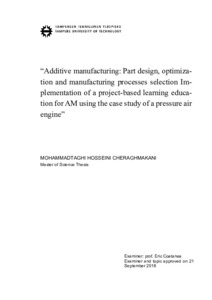Additive manufacturing: Part design, optimization and manufacturing processes selection Implementation of a project-based learning education for AM using the case study of a pressure air engine.
Hosseini Cheraghmakani, Mohammadtaghi (2018)
Hosseini Cheraghmakani, Mohammadtaghi
2018
Automation Engineering
Teknisten tieteiden tiedekunta - Faculty of Engineering Sciences
This publication is copyrighted. You may download, display and print it for Your own personal use. Commercial use is prohibited.
Hyväksymispäivämäärä
2018-11-07
Julkaisun pysyvä osoite on
https://urn.fi/URN:NBN:fi:tty-201810242441
https://urn.fi/URN:NBN:fi:tty-201810242441
Tiivistelmä
Additive manufacturing (AM), due to significant advancement from traditional manufacturing and new potentials has attracted significant interest in a diverse set of industries. Considerable advances have been made in the expansion of new and innovative AM processes. However, less attention has been paid to the teaching of these new processes in educational institutions.
While there has been comprehensive research into traditional manufacturing processes and its teaching practices are well established, few adequate additive manufacturing training programs exist to educate students in the field of engineering. To fill this gap in education, this thesis aims to design an AM training course specifically for mechanical engineers using state-of-the-art pedagogical methods.
Since traditional educational methods involved less student participation in the process of learning, one goal of this thesis is to encourage active student participation during the training course. The most critical stages of AM product development will be covered in a case study that students will carry out as part of the course.
This thesis proposes a comprehensive course for AM. A case study forms the prime core of the course content, and a combination of pedagogical methods are employed to enhance the quality of learning.
While there has been comprehensive research into traditional manufacturing processes and its teaching practices are well established, few adequate additive manufacturing training programs exist to educate students in the field of engineering. To fill this gap in education, this thesis aims to design an AM training course specifically for mechanical engineers using state-of-the-art pedagogical methods.
Since traditional educational methods involved less student participation in the process of learning, one goal of this thesis is to encourage active student participation during the training course. The most critical stages of AM product development will be covered in a case study that students will carry out as part of the course.
This thesis proposes a comprehensive course for AM. A case study forms the prime core of the course content, and a combination of pedagogical methods are employed to enhance the quality of learning.
